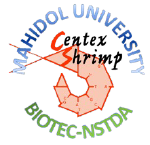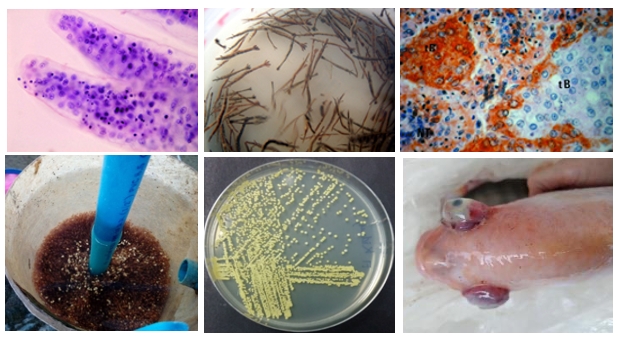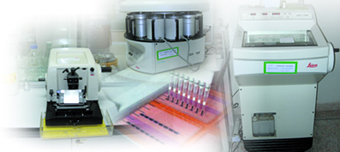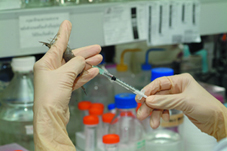


To help maintain Thai global leadership in the production of high-quality cultured fish and shrimp without negative environmental impacts.
The mission statement for Centex Shrimp is "Premier science for premium shrimp and fish". This means that its aim is to carry out academically excellent research on molecular biology and biotechnology of shrimp and fish for application in the production of the highest quality of consumer shrimp and fish.




Prof. Timothy W. Flegel, Ph.D.
Area of Expertise :
- Pathogen discovery in shrimp
- Shrimp pathology
Research Profile :
- https://science.mahidol.ac.th/expertise/
- https://orcid.org/0000-0002-1913-213X
- https://www.researchgate.net/profile/Tim-Flegel
E-mail : tim.flegel@gmail.com

Assoc. Prof. Rapeepun Vanichviriyakit, Ph.D.
Area of Expertise :
- Shrimp histology and histopathology
- Reproductive biology
Research Profile :
- https://science.mahidol.ac.th/expertise/
- https://orcid.org/0000-0002-8712-7578
- https://www.researchgate.net/profile/Rapeepun-Vanichviriyakit
E-mail : rapeepun.van@mahidol.ac.th

Assoc. Prof. Siripong Thitamadee, Ph.D.
Area of Expertise :
- Developmental Biology in plants and animals
- Nutrition and shrimp health
Research Profile :
- https://science.mahidol.ac.th/expertise/
- https://orcid.org/0000-0002-1980-0046
- https://www.researchgate.net/profile/Siripong-Thitamadee
E-mail : siripong.thi@mahidol.ac.th

Assoc. Prof. Ornchuma Itsathitphaisarn, Ph.D.
Area of Expertise :
- RNAi technology
- Shrimp molecular biology
- Interactions between shrimp and pathogen proteins
- Endocytosis pathway in shrimps
Research Profile :
- https://science.mahidol.ac.th/expertise/
- https://orcid.org/0000-0003-0371-3877
- https://www.researchgate.net/profile/Orn-Itsathitphaisarn
E-mail : ornchuma.its@mahidol.ac.th

Lecturer Vanvimon Saksmerprome, Ph.D.
Area of Expertise :
- RNAi technology for aquaculture disease control
- Microalgal biotechnology for controlling aquaculture disease
Research Profile :
- https://orcid.org/0000-0003-3007-9226
- https://www.researchgate.net/profile/Vanvimon-Saksmerprome
E-mail : vanvimon.sak@biotec.or.th

Lecturer Saengchan Senapin, Ph.D.
Area of Expertise :
- Molecular characterization of emerging and re-emerging pathogens of fish
- Fish immunity and vaccination
Research Profile :
- https://orcid.org/0000-0002-5599-4343
- https://www.researchgate.net/profile/Saengchan_Senapin
E-mail : saengchan@biotec.or.th

Asst. Prof. Thawatchai Chaijarasphong, Ph.D.
Area of Expertise :
- Development of CRISPR diagnostics for diseases in shrimp and fish
- Genome editing using CRISPR technologies
Research Profile :
- https://science.mahidol.ac.th/expertise/
- https://orcid.org/0000-0003-1302-0863
- https://www.researchgate.net/profile/Thawatchai-Chaijarasphong
E-mail : thawatchai.chi@mahidol.edu

Chumporn Soowannayan, Ph.D.
Area of Expertise :
Viral and Bacterial Diseases of Shrimp and Fish, Bacterial Biofilms and Their Controls, Bacterial communication, Shrimp Response to Viral Infection and Probiotics
Research Profile :
- https://orcid.org/0000-0003-2236-9151
- https://www.researchgate.net/profile/Chumporn-Soowannayan
E-mail : chumporn@biotec.or.th

Wilawan Thongda, Ph.D.
Area of Expertise :
Molecular and NGS tool utilisation to solve the problem that relates to aquatic animal health, breeding program, and conservation.
Research Profile :
- https://orcid.org/0000-0002-5611-8441
- https://www.researchgate.net/profile/Wilawan-Thongda
E-mail : wilawan.tho@biotec.or.th

Asst. Prof. Thanapong Kruangkum, Ph.D.
Area of Expertise :
Anatomical based research in aquatic animals, neuroanatomy and neuroendocrine in crustaceans, Neurogenesis and differentiation in crustacean
Research Profile :
- https://science.mahidol.ac.th/expertise/
- https://orcid.org/0000-0003-3191-5564
- https://www.researchgate.net/profile/Thanapong-Kruangkum
E-mail : thanapong.kru@mahidol.edu

Lecturer Anuphap Prachumwat, Ph.D.
Area of Expertise :
- Bioinformatics
- Genomics
- Microbiome
- Molecular Evolution
- Genomics of shrimp and their pathogens
- Emerging and re-emerging shrimp diseases
- Molecular biotechnology for shrimp aquaculture
Research Profile :
- https://scholar.google.com/citations?user=We_NkHEAAAAJ
- https://orcid.org/0000-0002-2009-5524
- https://www.scopus.com/authid/detail.uri?authorId=9939200600
- https://zebra.nstda.or.th/rcv/rcv_des.php?id=MTU4
E-mail : anuphap.pra@biotec.or.th, anuphap.pra@mahidol.ac.th

Lecturer Patai Charoonnart, Ph.D.
Area of Expertise : Microalgal biotechnology for controlling aquaculture disease
Research Profile :
- https://orcid.org/0000-0002-3532-6575
- https://www.researchgate.net/profile/Patai-Charoonnart
E-mail : patai.cha@biotec.or.th

Warachin Gangnonngiw, Ph.D.
Area of Expertise : Using of the cell culture technique, construction of infectious clones, and using insect cell models to explore the virus-host response in aquaculture research or related fields.
Research Profile :
- https://orcid.org/0000-0002-5533-3254
- https://www.researchgate.net/scientific-contributions/Warachin-Gangnonngiw-39795495
E-mail : warachin.gan@biotec.or.th